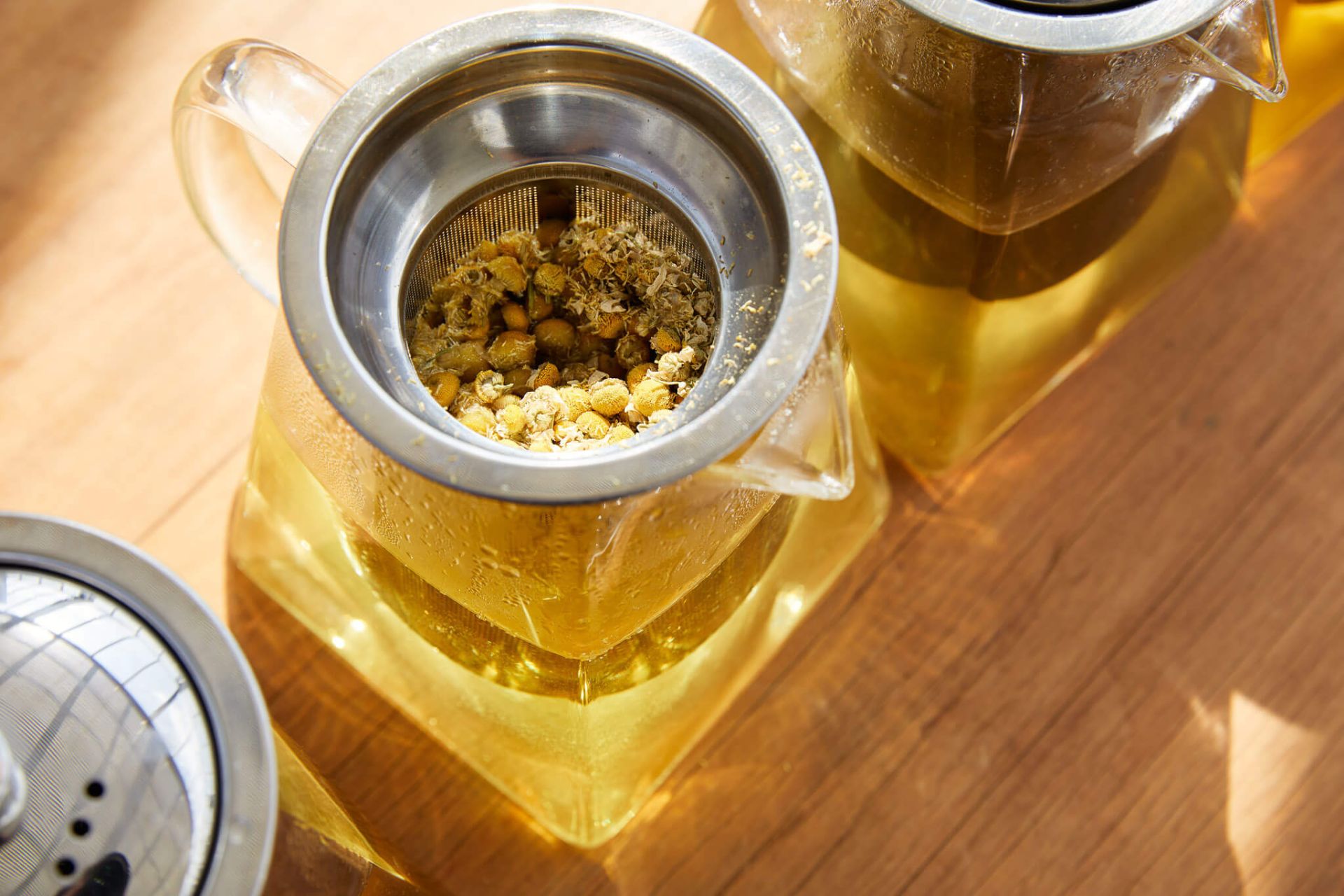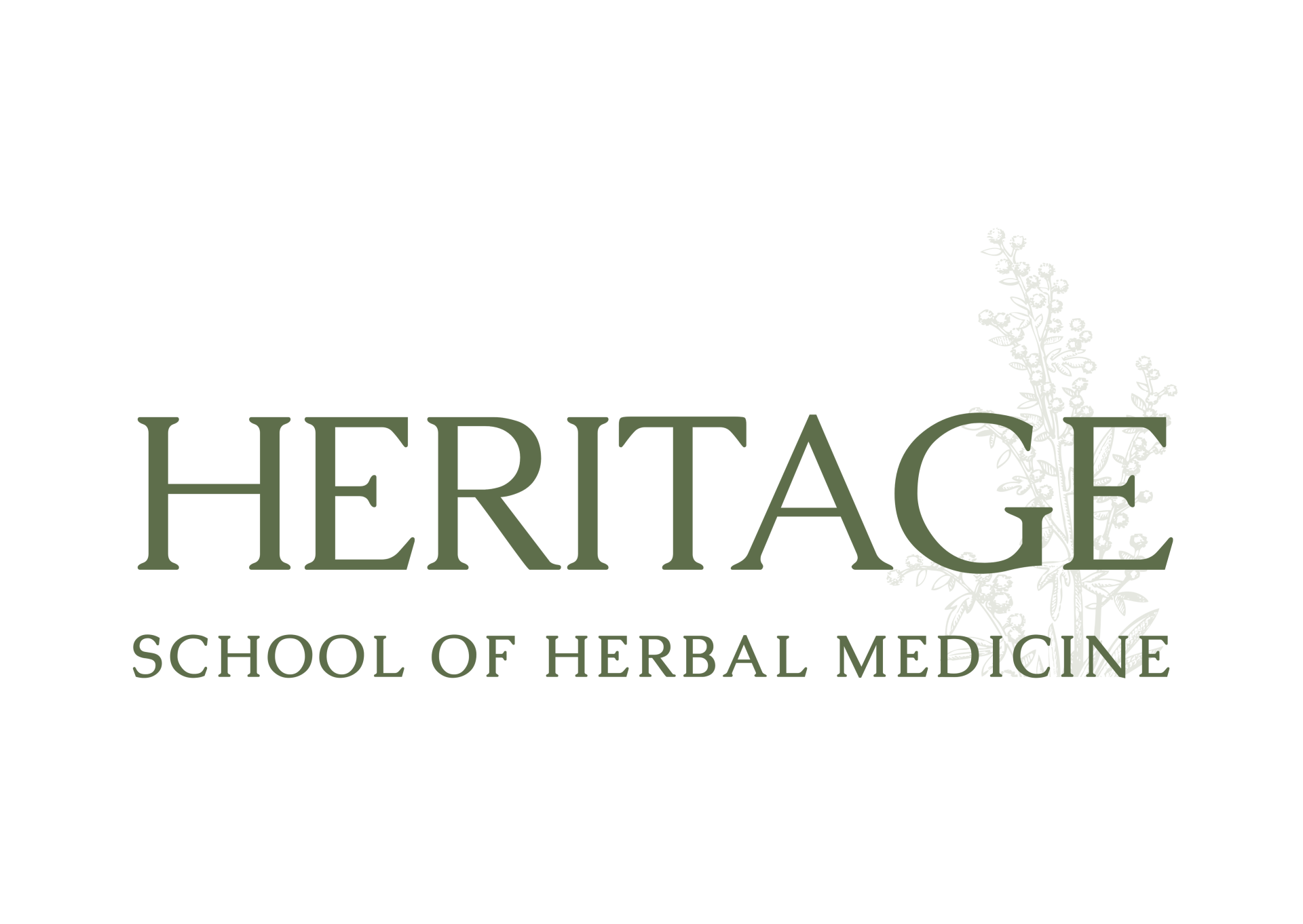Almost every student of herbalism is keen to roll up their sleeves and start making a plethora of herbal remedies as soon as possible. Whilst our intensive herbalism course does involve plenty of hands-on remedy making time, you may be wondering why we wait until our summer in-person gathering to get fully stuck into creating lotions and potions. Read on to learn why making tea is one of the key herbalism basics we work with extensively on our course.

Why Making Tea Is One of the Key Herbalism Basics
During the spring/summer live Zoom sessions of our course, we spend those first twelve weeks practicing a very important form of herbal remedy - tea. It’s simple and straightforward and something worth making a habit of, because it engrains working with herbs as a normal part of daily life.
Each week, we drink the tea of just one of our twelve herbs, creating a focused portal of relationship building between student and plant. It’s not a daunting task with lots of clean up or ways to go wrong so students can both practice making a herbal remedy, whilst concentrating on getting to know that herb.
Tea Drinking as a Gateway to Turning Up the Volume on Intuition
Tea drinking is also our gateway to embodied learning, tasting the herb, feeling how it moves through the body, noticing the effects it has, turning up the volume on our intuition - another key aspect of herbalism. Students spend the week drinking that week’s herb and then we discuss it in detail.
Why? Because that way, they’ve had time to feel it. They’ve noticed changes happening in their bodies as a result of drinking the tea of the herb. They’ve started to feel if it’s more warming or cooling, drying or moistening, tightening or relaxing. The tastes of that herb have begun to imprint themselves on their tongue.
And we do this practice week after week in the same way, so that through rhythm and repetition, the concepts we introduce at the spring gathering sink deeper into their hands, their hearts, their minds. Together on the Zooms, we drink the tea and work through all the fundamental aspects of that herb, with students jotting down notes as we go. Each week, the concepts get clearer because they are felt.
Our students are learning the herb and listening to their body’s response to it - and the more we listen to our bodies, the more we turn up the volume on our intuition, another fundamental herbalism basic.
Knowing the Herbs Comes Before Making Remedies - Herbalism Basics
But I want to start making lots of jars and bottles of exciting things straight away, you may be thinking! Yes, it is a wonderful process. However - here is a key difference between a weekend herbal workshop and our intensive course: it is crucial you get to know the herbs thoroughly first so that you understand what you are making.
We don’t get in a car and start driving without first learning what all the controls do and what all the road signs and markings mean - unless you’re at a fair and having a go at bumper cars! We also don’t dive straight into making all kinds of balms and tinctures without understanding the plants we’re working with first.
How many different ways can you work with the remedy you’ve prepared, so that when you need it, you know to reach for it? Do you know in your bones which herbs to include in a blend for an intended purpose, or are you just following someone else’s recipe? Have you begun to observe what the regular needs of your family and yourself are so you can create herbal remedies you will actually use over and over, rather than collecting jars that look lovely, but don’t necessarily get used often?
When we begin making a myriad of remedies in earnest at our first-year summer gathering, when someone asks what they can use what we’ve made for, the entire cohort chimes in. And it’s not just one chorus of ‘this salve is for superficial wound healing’. Our students know multiple ways they can employ each of the remedies we make. And that is because they’ve absorbed their herbalism basics first. They have developed a deep relationship with and understanding of each plant beyond chamomile ‘for sleep’ or lavender ‘to relax’. They are learning to drive, as it were, rather than having a go at bumper cars. Once you learn to drive, you can take yourself anywhere, but with bumper cars, you’re limited to the confines of the ride.
Skilfully Crafting Other Herbal Remedies
Once we gather in the summer of the first year of our course, our students are unleashed. They have been waiting for this moment and anticipation is at its height. They are ready to soak everything in.
Aprons are donned. Sleeves are rolled up. Bowls are scraped and remnants slathered on any scrap of skin in sight. And lots and lots of washing up is made!
But amongst all the excitement and tea towels, there is deep learning happening. We’re working through solid remedy making methods for each type of herbal remedy. What is the base remedy? What order do we do things in? What colour, consistency, texture, smell are we needing to gauge? Which types of herbs combine well with which types of remedies - and which don’t?
We look at samples of different proportions of beeswax to herb-infused oil before we make our salves to understand why the recipe is as it is. We make both the folk method of tinctures and the weight-to-volume method so we can compare the taste, colour, smell, potency of the final remedies once they’ve macerated over the summer. We look at samples of each of our herbs slow-infused in oil to we have a reference for colour, smell and texture. We explore when, why and what herbs you’d work with when it comes to salves versus creams versus body butters.
There’s a lot more knowledge being absorbed beyond the fun of remedy making - and we do have a lot of fun!
So if you’re looking for a herbal gathering primarily focused on making lots of different lotions and potions to either dip your toe into herbalism or as a hobby, then our intensive herbalism course probably isn’t the best fit for you. However, if you want to learn herbal medicine deeply, exploring its dynamics, building relationships with medicinal plants, getting to know the inner workings of the human body and ultimately learning the skills to effectively create herbal remedies that will pair the herbs and the person through the most appropriate medium to bring balance and vitality to your health and that of your loved ones, then I would encourage you to join us.
You will build the habit of making and drinking herbal tea regularly whilst establishing a deep connection and relationship with each of the course’s herbal familiars. Through this practice, you will be guided in feeling the energetics of each plant and how it moves and impacts the body first-hand within your own body. Finally, when you do begin working with other types of herbal remedies, you will learn their nuances so the skills you acquire and muscle memory you develop in making them will give you confidence in both the potency and effectiveness of what you are crafting, which respects both the plants and yourself.
If you’re here in the UK, you’re very welcome to join us on our intensive herbalism course - Awaken Herbal Wisdom - which spans all four seasons. With up to three years of development available, our course gets herbalism both deep into your bones and your daily life, without either having to do a clinical degree or a traditional full-time apprenticeship. Although it is intense, it’s suitable for a wide range of herbalists, including beginners!
Be sure to join our mailing list to hear more about what the current cohorts are up to, learn some of the golden nuggets that emerge from our sessions and receive other school updates. Enrolment opens after dates are announced each spring for the following year, and places are filled on a first-come, first-served basis. If you’re ready to join us on the journey, you can request an application to join an upcoming cohort.
Whatever your next step is with learning herbal medicine, I hope you enjoy the journey!
At the Heritage School of Herbal Medicine, our practice of herbalism is rooted in the belief that we must remember, reclaim and relearn our knowledge of our bodies, our autonomy and how to work with plant medicine in order to bring control of our own health back into our families and homes for a sustainable future for ourselves and the planet. Through our intensive herbalism course, we facilitate the development of confident, empowered herbalists, attuned to the messages of their bodies and the natural world. Living the deep wisdom of herbal medicine within themselves, their homes and their communities, they uplift themselves and others, creating a stronger society organically. We do hope you'll join us on your journey!

